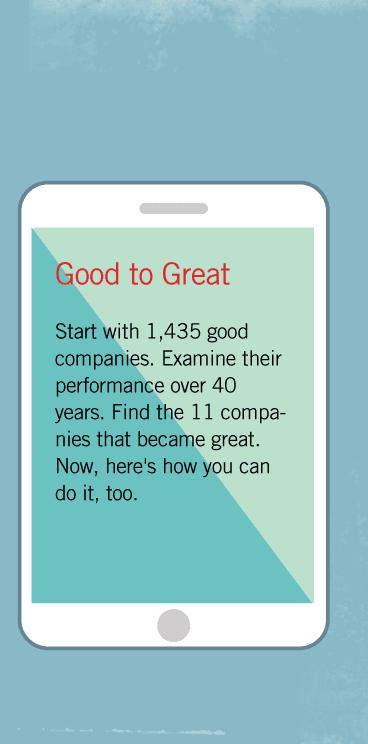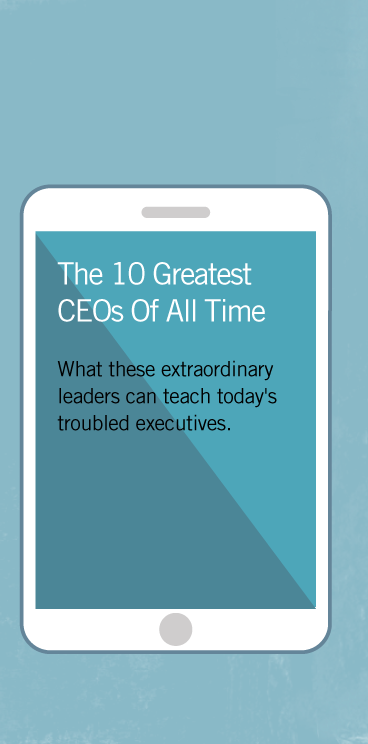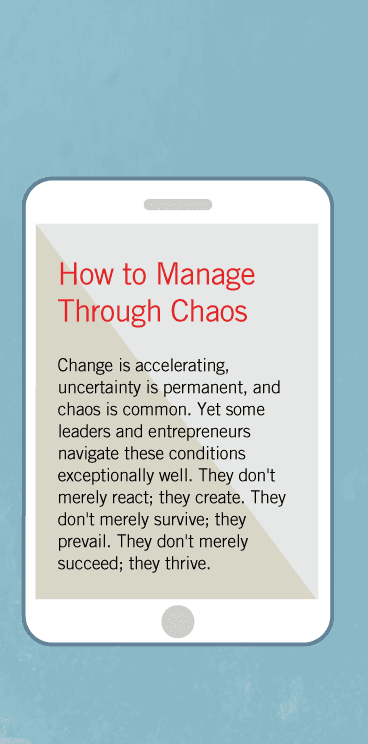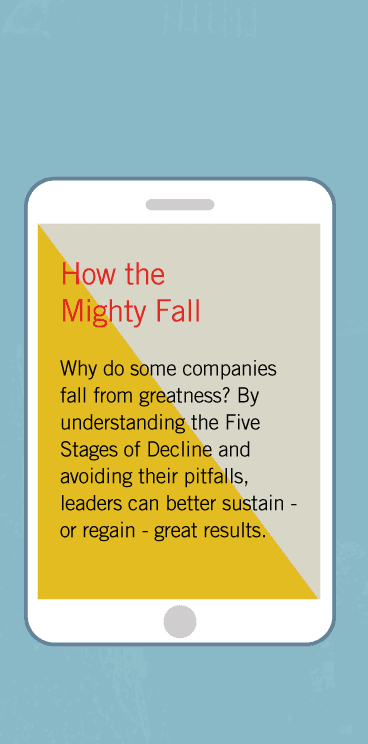Best Beats First
Of all the new economy’s supposed “rules,” the notion that nothing is as important as being first to reach scale may be the most widely accepted. It’s also wrong.
I recently met with the CEO of a hot Internet company who described his concept for competing on the Web: “It’s a big land rush,” he explained. “It’s all about being the first to build critical mass and create a brand name.” Then, in a bizarre twist, he admitted that his company’s Web site didn’t work all that well and that customers might be disappointed by their early experiences. “But it doesn’t matter,” he said. “The whole game is to stake out your territory.” His strategy hinged on one simplistic idea: be there fast, be there first, and you win.
When asked to explain what would protect his company from the inevitable assault by huge companies with deep pockets and vast preexisting customer sets, he said: “Inertia! Our competitive advantage is their inertia. By the time they wake up, the game will be over, and we will have won.”
Well, the inertia of others is not a sustainable advantage. His company will be crushed by the likes of Walgreens and Wal-Mart in the end. They may be slow—following a crawl-walk-run trajectory—but when they run, they will run right over the companies that believe being first to build market share and brand name is all that matters.
In fact, being first seldom proves to be a sustainable advantage and usually proves to be a liability. VisiCalc, for example, was the first major personal-computer spreadsheet. Where is VisiCalc today? Do you know anyone who uses it? And what of the company that pioneered it? Gone; it doesn’t even exist. VisiCalc eventually lost out to Lotus 1-2-3, which itself lost out to Excel. Lotus then went into a tailspin and was saved only by selling out to IBM. Similarly, the first portable computers came from now-dead companies like Osborne Computer. Today we use portables primarily from such companies as Dell and IBM. Or consider the ubiquitous Palm-Pilot. It was hardly the first to market, lagging years behind early leaders Sharp and—in particular—Apple, with its high-profile Newton MessagePad.
The PalmPilot-versus-Newton case perfectly illustrates why it’s often better to enter late, not first. “The PalmPilot’s creators had their first design meetings at a particularly useful point in history—after the debut of the Apple Newton,” wrote David Pogue in his definitive PalmPilot: The Ultimate Guide. The Newton used software designed to learn its owner’s personal handwriting, which meant that the computer had to adapt to millions of possible variations. A Doonesbury comic strip captured the experience of frustrated Newton owners: A man scrawls, “I am writing a test sentence!” and the machine throws back “Egg freckles?”
Learning from the Newton, PalmPilot designers figured it would be better to have one reliable script that millions of people could learn rather than the other way around. It worked, and the script Graffiti has become second nature for more than 6 million people happily scrawling away on their PalmPilots.
The pattern of the second (or third or fourth) market entrant’s prevailing over the early trailblazers shows up throughout the entire history of technological and economic change. IBM didn’t have the early lead in computers. It lagged far enough behind Remington Rand (which had the Univac, the first commercially successful large-scale computer) that people called its first computer “IBM’s Univac.” Boeing didn’t pioneer the commercial jet. DeHavilland did, but its Comet lost ground when 7 of the company’s first 21 jets crashed owing to metal fatigue—not exactly brand-building news. Boeing, slower to market, invested in making the safest, most reliable jets and dominated the airways for more than three decades. American Express dragged its feet about getting into the charge-card business and introduced its first card eight years after the early leader, Diners Club International. Using Diners Club’s billing and bookkeeping problems as a cautionary tale, American Express built a better, more reliable service. Where is Diners Club today? Disney was a late entrant into family theme parks. In fact, the whole idea for Disney’s move from making movies to running theme parks came when Walt Disney visited some amusement parks (he called them “dirty, phony places, run by tough-looking people”) and simply decided that he could build something better.
I could go on for pages, with dozens of examples. Nucor didn’t pioneer the minimill. Starbucks didn’t pioneer the high-end coffee chain. General Electric didn’t pioneer the AC electrical system. Wal-Mart didn’t pioneer discount retailing. All those companies were second, third, fifth, ninth, or even further back. Yet they prevailed, while the early leaders fell hopelessly behind or disappeared altogether. No, they were not first. They were better. And, except in rare cases, best beats first, even if it takes a long time.
That simple truth was well understood by a patient and wise man named Cyril Yansouni, general manager of the Hewlett-Packard Personal Computer Group in the early 1980s. A young product manager marched into Yansouni’s office, worried that HP was blowing its once-in-a-lifetime opportunity in portable and personal computers. “We have a window of opportunity—one chance to build critical mass,” said the product manager. “We’re behind in picking the right operating system, and we’re going to be late with a DOS machine, and all these other companies are going to fill the channel first. And we’ll never recover!”
Yansouni listened while the product manager paced about, gesticulating frantically, and then he calmly and quietly responded: “We might fall behind at first. But we will learn from our own mistakes and the mistakes of others. We don’t have to be first so long as in the end we figure out how to be best. It might take 10 or 15 years, but we’ll figure it out.” Ten or 15 years? The young product manager thought Yansouni was nuts.
In the end, however, Yansouni proved to be right. It took 17 years, but a headline from a recent issue of USA Today read, “H-P tops Compaq as No. 1 in PCs.” As of February, according to the article, HP held 42% of the retail PC market. Yansouni understood that even in exploding and rapidly changing new markets, the best companies with the best solutions eventually triumph.
Best, of course, has only one relevant judge in the commercial sphere: the customer. JVC understood that in the early days of the home-video-system wars. Sony’s Beta format might have had technical superiority, but the VHS designers learned from one crucial Beta mistake: customers valued recording-time capacity over picture quality, and Beta came out with a system that could handle only one-hour recordings. VHS pulled out in front when it introduced a machine with a two-hour capacity.
Granted, there are a few exceptional cases where being first virtually guarantees a sustainable advantage; they generally fall into three categories. First, if you can lock up ironclad patent protection, then you’re set for years. Second, if you have a proprietary industry standard, such as MS-DOS, you can hold a dominant position despite the presence of better solutions. Third, if customers find it too much of a hassle to move over to a better solution, they’ll stay with you despite having better options. There are better keyboard layouts than QWERTY, for example, but we all stay with QWERTY because it’s too much trouble to learn how to type all over again.
But the great irony of many Internet companies—with all their frantic ranting about being first to build critical mass—is that they are generally in businesses that don’t fall into those exceptional categories. In fact, the very thing that makes Internet businesses a threat to traditional companies—the ease and speed with which a few people can cram together in a small garage and create an alternative solution—also makes them vulnerable to counterattack when traditional companies link bricks to clicks.
Of course, the greek chorus will sing that the new economy is different and that all this history holds no relevance. They argue, in essence, that it’s a big land-grab—in which staking a claim prevents would-be followers from entering—and that early leaders will lock in customers, creating a virtuous cycle of growth feeding growth. And their argument has a ring of plausibility. But there’s a problem: customers have more control of their choices than at any time in history (that is, after all, one of the cherished tenets of the new economy), which makes the first-mover advantage even less potent, not more. It’s ironic, when you think about it, that the primary argument for that new-economy strategy uses analogies drawing on events that took place in the 1800s; I mean, how much more old-economy can you get than gold mines and land stakes? So let’s be honest: the “invest in us because we’re first” line has largely been used as a ruse to lure investors, not to build companies. Being first adds up to little more than delusion and hype—it’s good for duping investors and making founders and venture capitalists rich. But it’s certainly not enough to build an enduring great company. Fortunately, with the recent difficulties of the Nasdaq, it appears that investors are finally catching on to the game.
We can already see the fundamental laws of management and commerce reasserting themselves. Consider America Online, clearly a new-economy star that got there by being better, not first. As Kara Swisher describes in her book aol.com, AOL lagged far behind CompuServe and Prodigy, and as late as 1992 had only 200,000 members compared with Prodigy’s nearly 2 million. AOL beat out the early leaders not because it had the ultimate solution, but precisely because it knew that it didn’t. So long as AOL continues the process of nonstop improvement and evolution—step-by-step improvement in the eyes of the customer—it will likely remain strong.
So if you feel that you’re missing the great gold rush—fearing that all the good real estate will be taken by those who got there first—take heart. It doesn’t really matter who gets there first, so long as you figure out a way to produce a better solution, doggedly persist in bringing that solution to the world, and continually improve. And if you happen to have the misfortune of being first, of being the early leader in market share, then keep in mind that someone—right now—is learning from your mistakes. The enterprises that emerge from this hype (and from this lurching stock market) as enduring great companies will in most cases not be the early leaders. No, the companies that prevail in the end will be those that have executives who live by the simple adage “Good enough never is,” even if good enough can make us rich.






